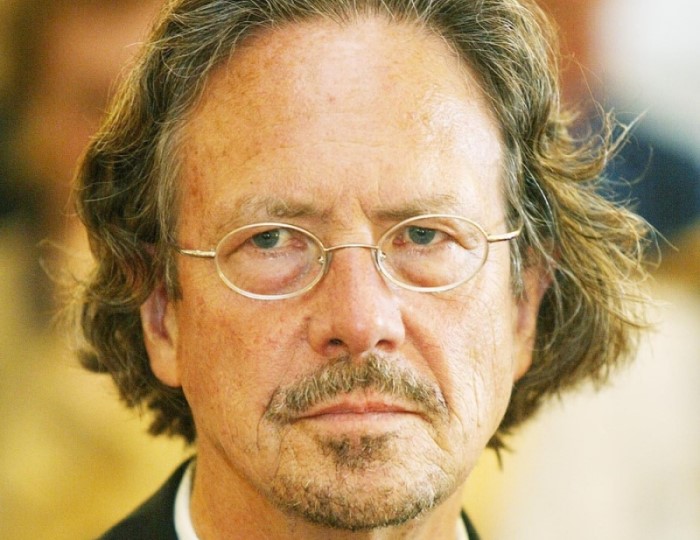Morality on the Side: Peter Handke and the Nobel Prize
Debates about separating the art from the artist are not waning. In the last couple of years, we have seen the rise and fall of many artists. Yet, with some of the artists the fall seemed less imminent, and perhaps even unlikely. The world was fast in condemning the actions of Kevin Spacey, praised for his role in House of Cards. While on the other hand, Woody Allen’s work seems to experience little hindrance, despite allegations of sexual abuse. This is certainly not an isolated case, as Michael Jackson and Johnny Depp prove. But how do we decide which art and what artist to condemn, and which art we ought to separate from questionable morality of its creator. Can we appreciate art in isolation from moral considerations?
The Nobel Committee awarded the Nobel Literature Prize of 2019 to Peter Handke, Austrian novelist, playwright, translator, poet, film director and screenwriter. What followed was an explosion of moral outrage, with vast number of individuals and institutions condemning the Nobel Committee’s decision. Handke is widely known for speeking at the Slobodan Milosevic’s funeral, espousing strong nationalistic views and refusing to acknowledge the crimes of Milosevic regime during the war in the Balkans. When NATO decided to react to the ongoing massacres, Handke wrote an open letter stating:
“Mars is attacking and since March 24th, Serbia, Montenegro, the Republika Srpska and Yugoslavia are the fatherland of all those who have not become martial, green butchers.”
Thus, it ought not come as a surprise that many consider Handke a person of deplorable morality. Rafia Zakaria described his work as “represent[ing] so well the right side of the political divide in Europe, the one that seeks to revitalize an imagined past and perceive the present as a moment of victimization by encroaching others, women, minorities and particularly the irksome migrants.” Many commentators do not find value in separating Handke’s literary works from his politics. Can we even understand an artist’s art if isolated from the views they publicly espouse? Should we?
There are several ways to answer that question. First, the simplest answer would be: yes, one must separate the art from the artist. The reasoning for such an argument might be based on the claim that truly great art is transcendent, it “can stand on its own outside of history and speak to anyone from any place and time,” and if it cannot “it’s not really great.” In case of Handke, this would mean that we foremost need to look at Handke’s work in isolation from the author, and if the work has some kind of value for us, then appreciation is warranted.
Another potential answer derives from the Roland Barthes statement that the author is dead. This viewpoint holds that it is the reader who assigns the meaning to the text by engaging with it, rather than the author’s internal considerations. Hence, the author is irrelevant for understanding of the text and “has no control over … final interpretation.” As Swift and Hayes-Brady put it “engaging critically with a work of art is completely different from endorsing the morality of the artist.” Looking at how this fits into our consideration of Handke’s work, one might say that it is fundamentally understanding that we assign to a certain work that matters, and not some sort of a universal meaning assigned by the author.
In addressing the question of whether we can separate art from artist, we might also ask, as Constance Grady puts it, whether the “work of art is asking me as a reader to be complicit with the artist’s monstrosity.” In appreciating the art, are we also forced to acknowledge traits of artist’s deplorable morality and actions in his/her art? Is the art asking us to be complicit or adopt their particular worldview? Depending on one’s answer, engagement with the work of art might need to change.
Lastly, by engaging the art of morally questionable artists, one might be providing economic benefit to the author. We have reason not to show this kind of support and to avoid public sponsorship (for discussion see Benjamin Matheson and Alfred Archer’s “Should We Mute Michael Jackson?”). By buying Handke’s book we are awarding the work that is based on the perpetuation of immoral viewpoints.
Regardless of the ongoing debate on separating art from the artist, Peter Handke’s statements, worldview, and actions that serve to minimize the genocide which occurred within living memory, and even go so far as deny the existence of concentration camps, must be condemned. There is no debate or question regarding that. As such, one must wonder how we should regard the Nobel Committee’s controversial decision? As Handke takes the stage in Stockholm to receive the prize, it will not only be him who will be awarded but also his professed views. One is no longer talking about separating the artists from their art, but supporting and condoning the artist in their totality. When Albert Camus was accepting 1957 Nobel Prize for literature he proclaimed that there are two roles of a writer: “the service of truth and the service of liberty.” Handke does service to neither. Not only did Handke himself show willingness to defend a war criminal but his art did, too. In Journey to the Rivers: Justice for Serbia “he went out of his way to give credence to mass murder and, in this context, as importantly, to lies.” Handke even offered to testify on Milosevic’s behalf at the Hague. Hence, Handke is both a person of dismal morals and an artist who uses art to profess his viewpoints. The Nobel Committee erred badly this time by deciding to silence the voices of genocide victims and instead gave credibility to, and encouraged, an apologist of genocide.





